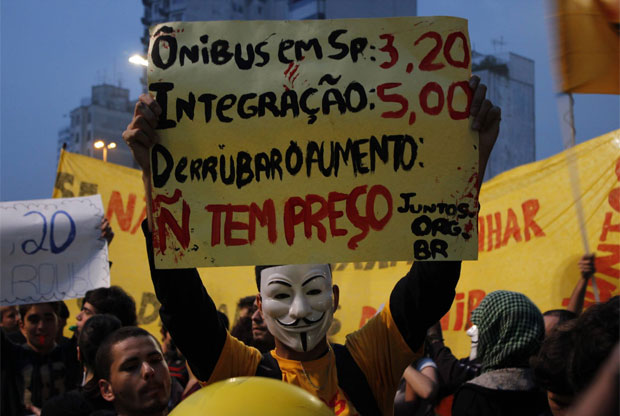Brazilian sociologist threatened at gunpoint after criticising police
A Brazilian sociologist says he was threatened at gunpoint in Rio de Janeiro last week, after he gave a newspaper interview criticising police action in recent popular demonstrations.
Paulo Baía says he left home around seven o’clock last Friday, 19 July, to take a walk in Flamengo Park, when two armed men wearing balaclavas and sunglasses put him into an unmarked car with tinted windows.
“They told me I should give no more interviews like the one I gave today to Globo and that I shouldn’t say anything else ever again about the Military Police because, if I did, it would be the last interview I would give in my life”, Baía told Globo newspaper.
Globo printed Baía’s interview on the same day he was flash kidnapped. In the article, the sociologist from Rio de Janeiro’s Federal University (UFRJ) analysed groups that acted more violently during demonstrations that happened days before at Leblon, a higher-class area in the south side of Rio. He was critical of police action towards protesters.
“Police saw crimes being committed and did nothing. Police’s message was this: now I’m going to beat everybody up”, he told Globo on the interview.
Baía says he was eventually left at Cinelândia, a public square in Rio, 20 minutes after he was kidnapped. He says guns were not pointed at him, but his kidnappers made them visible the entire time.
The sociologist is wary of alleging that his kidnappers are policemen, as he says that they may be imposters attempting to make a case against the military police.
Later on Friday Baía met Rio State attorney general Marfran Vieira, who said that both the Public Ministry and the Civil Police would check images taken by CCTV cameras at Flamengo Park and Cinelândia.
“This was an attempt to shut down an important voice in the political scene and ends up harming the democratic state based on the rule of law”, said Vieira.
Popular demonstrations that started on early June recently became more violent in Rio, where some protesters have targeted journalists and media outlets, and have also vandalised businesses.

 Journalist José Cristian Góes says case brought against him is a “direct attack on free speech. Rafael Spuldar reports
Journalist José Cristian Góes says case brought against him is a “direct attack on free speech. Rafael Spuldar reports